Lying Bass and Tough Talk
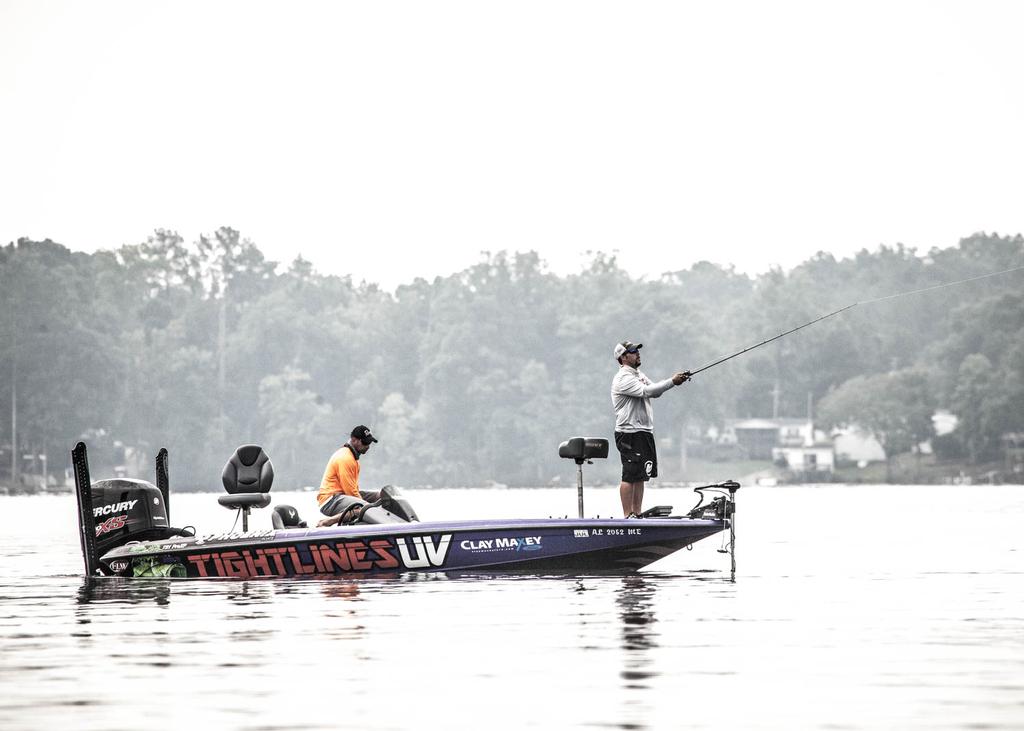
Liars.
Usually anglers call one another liars (especially in regard to what they’ve found during a tournament practice), but David Dudley says that about fish. Specifically, he refers to bass caught during a practice that can lead an angler astray because conditions are changing and they don’t present a clear picture of what will happen come tournament time.
An unseasonably cool, dark and misty first day of practice produced good action for several Forrest Wood Cup competitors, but some of those fish caught might have been lying bass. The general word is that fishing got tougher on days two and three, with more sun and higher temperatures.
“I’ve had some bites, but I’m not really sure what I have,” Dudley says. “When it’s tough, like it is, you stay off where you think you might get bit because you don’t want to catch those fish in practice. We’re trying; but we’re not trying.”
Three days of Forrest Wood Cup practice ended Tuesday afternoon, leaving 45 competitors a day off to consider all they’ve learned and devise a starting plan for Thursday morning, when the four-day world championship begins.
The right starting spot could turn out to be critical because by far the best bite for most anglers has occurred early.
“There’s a window of opportunity,” says Barry Wilson. “Basically, after 9 a.m., it’s done, and then it’s really a grind.”
Wilson felt like he had figured out something on Monday afternoon and tested it Tuesday morning with very good early results. He wasn’t setting the hook, so he can’t be fully certain about sizes, but he got good early action and saw some of the fish. They were the quality of bass he wants to catch during the tournament.
Wilson spent a week at Lake Murray prior to the start of the off-limits period and fished long days to catch a few keepers. The official practice was somewhat better, but he says each day was different, so he’s not certain what to expect when the competition begins.
Up, Down and In Between
“I’ve been fishing with 14 rods on my deck. I still have 14 rods on my deck,” says 2011 Forrest Wood Cup champion Scott Martin. “Normally you try to reduce that number as you figure things out, but I have 14 rods to rig tonight.”
It’s not that Martin didn’t catch fish in practice. He did. But he caught a few fish a lot of different ways, and the bite changed quickly as conditions changed. The sun would come out or the wind would stop blowing, and whatever had been working would totally shut down.
“You might catch them deep, shallow or in between. It’s so unpredictable,” he says. “You could easily go out there and not catch a single keeper.”
Many pros have tossed out a guess of 13 or 14 pounds per day as the daily average weight needed to win, but Martin thinks that might be high.
“It probably would have been 13 pounds a day during practice, but if the sun shines like it’s supposed to, that’ll take away half of the patterns that have worked,” he says. “So it might be less.”
The tournament forecast calls for sunny to partly cloudy skies and high temperatures ranging from 89 to 94, with a gradual temperature rise through the weekend and minimal wind.
Anthony Gagliardi, who lives on Lake Murray, expected all along that the bite would be tough.
“It’s just so unpredictable in August,” says Gagliardi, who agrees with the 13-pounds-per-day estimates. “We get heavy rain and clouds, and it cools the water. Then the sun shines, and it’s in the 90s for a few days and warms up again.”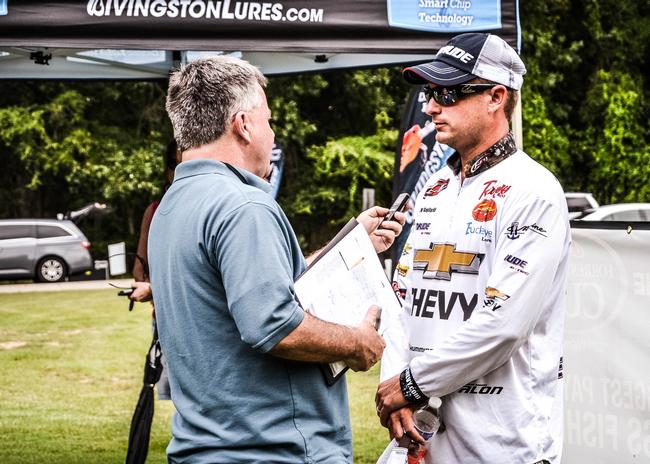
Herring Factor
Gagliardi and Casey Ashley of Donalds, S.C., are widely looked at as tournament favorites in large part because of their understanding of the behavior of largemouth bass in relation to blueback herring.
“This is anybody’s game,” Ashley says, talking down that idea. “This lake is a different animal than any other lake in South Carolina. They don’t act the same way as they do in other herring lakes.”
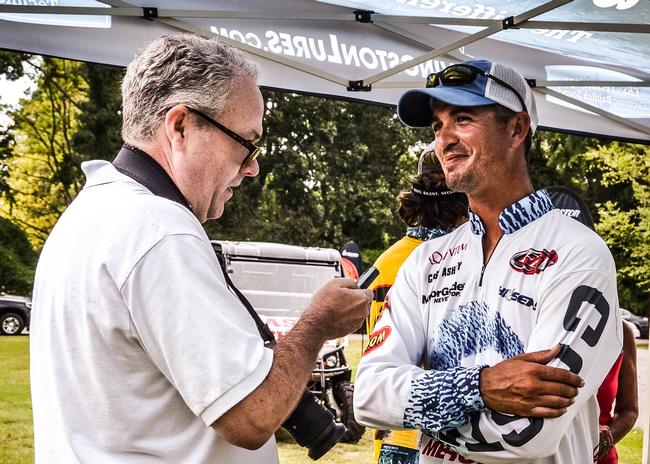 Like many pros in the field, Ashley believes the winner will mostly fish shallow.
Like many pros in the field, Ashley believes the winner will mostly fish shallow.
“It’s going to be a junk-fishing tournament,” he says. “It’s going to be won shallow. A few key fish might come from the deep water, but you won’t do that every day.”
Shallow versus deep is a critical decision, and many pros agree that a winning strategy has to be shallow or a deep/shallow combination because the deep fish suspend and roam, following schools of herring. They are robust, scale-tipping fish and therefore can represent a gold mine for anyone who finds a willing group. However, in a manner of speaking they tend to be here today and gone tomorrow.
Jacob Wheeler won the 2012 Forrest Wood Cup on a herring lake – Georgia’s Lake Lanier – but he, too, has found Murray to fish differently than other herring lakes. Wheeler spent a couple of days fishing Lake Murray prior to the cut-off.
“It was brutal then; it’s brutal now,” he says. “This kind of bite is mentally challenging because you can be doing the right thing for a couple of hours and not get bit. It’s easy to decide you need to change. But if you keep doing the right thing, eventually you get one here and one there.”
Starting Fresh
Walmart FLW Tour Angler of the Year Andy Morgan stayed away from Murray during pre-practice, which was only in part due to a busy schedule.
“I knew it was going to be difficult, and I didn’t want to dull my confidence. I stayed away, and I’m glad I did,” he says.
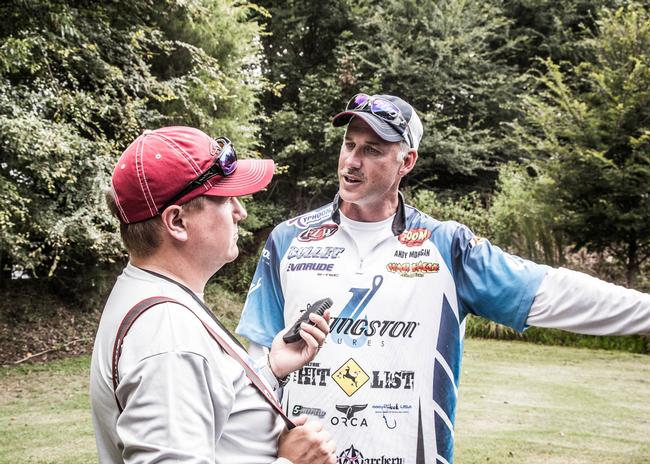 Morgan caught some fish during practice, but he pointed out that practice days are 13 hours long.
Morgan caught some fish during practice, but he pointed out that practice days are 13 hours long.
“Take five hours off that [in a competition day], and it might be tough to just bring in a limit,” he says.
Morgan says Murray’s water clarity is pretty good. Not too clear, nor too dirty.
“You could still catch them in 2 feet of water,” he says. “There’s plenty of color for them to be that shallow.”
Walmart pro Mark Rose traveled to Lake Murray prior to the cut-off with the intention of fishing for three full days, but he left after three-fourths of a day. It was so tough that he didn’t want to fill his mind with negative ideas and think too hard about it all.
“It was better just to go home and then to come back for practice to approach it fresh,” Rose says.
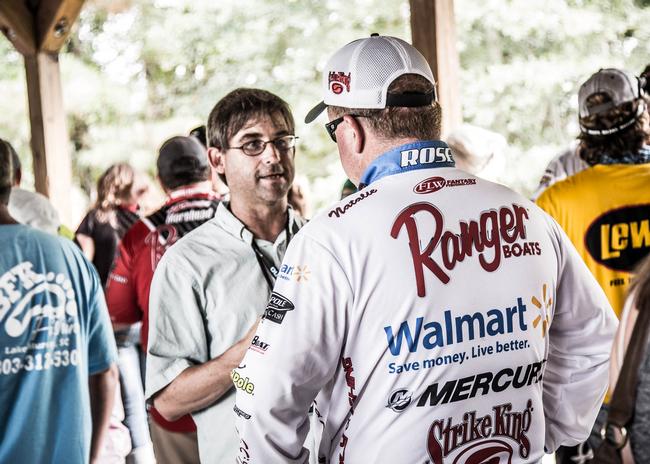 The lake level has come up a bit since Rose was here previously, and the water has cleared some. The bite for him was challenging then and now.
The lake level has come up a bit since Rose was here previously, and the water has cleared some. The bite for him was challenging then and now.
“It’s tough, but that’s OK,” Rose says. “It makes for a good tournament. Whoever wins this will be someone who handles the adversity and makes the right adjustments. And that’s who you want to be holding up the Forrest Wood Cup.”